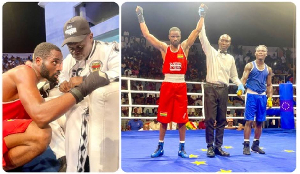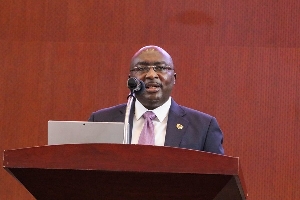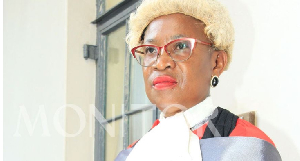- Home - News
- TWI News | TV
- Polls
- Year In Review
- News Archive
- Crime & Punishment
- Politics
- Regional
- Editorial
- Health
- Ghanaians Abroad
- Tabloid
- Africa
- Religion
- Election 2020
- Coronavirus
- News Videos | TV
- Photo Archives
- News Headlines
- Press Release
Editorial News of Wednesday, 8 November 2006
Source: Statesman
Editorial: Curbing corruption beyond perception
Corruption is roundly defined as the abuse or misuse of public office or power for private gain or profit. Going by this definition corruption in Ghana here is endemic. It ranges from day-to-day petty corruption, such as road traffic bribery to grand grafting, involving multi-million dollar public procurement deals.
Rather than focusing on the perception of corruption, we should be focusing on the more important issue of whether or not the opportunities for corruption have expanded or contrasted in the past few years. Generally, we believe there is an ongoing squeeze on the opportunities of corruption, even though we accept that one major opportunity is increase in public spending. With a record amount of money going into public procurement, especially, social infrastructure, the opportunity for profiteering also increases.
But, beyond increase in public spending, there are clear constitutional and legal frameworks which are gradually narrowing the avenues of graft. The judiciary, the SFO, CHRAJ and the Police Service are all in a better shape today than they were 2,3,4,5,6, or 7 years ago. Also, civil society advocacy groups have been created and strengthened to increase the pressure on the anti-corruption valve.
Even though, 2002 was Ghana's best showing on the TI corruption index, this was even before the drastic overhaul of customs procedures with the introduction of the GCNet and ASYCUDA. This was before the Financial Administration Act, 2003; Internal Audit Act, 2003, Public Procurement Act, 2004, and the Whistleblowers Act, 2006. Yet, the 'zero tolerance for corruption' slogan was still fresh and former NDC officials were being lined up before the Fast Track High Court. We need to look beyond the veil of perception because there is no way the facts can support the claim that incidences of corruption are worsening.
The Fast Track Court was recently able to rule that a $28 million procurement deal was illegally awarded. This could not have happened a few years ago, because the legal framework was simply not there. But, can such a case be used to say corruption is on the ascendancy or that the detection of corruption is rather increasing? What about Hackman Owusu-Agyemang stopping a ¢40 billion water project contract because it did not comply with the Public Procurement Act?
So, with such large scale unlawful or improper self-enrichment part-defining our culture of socio-economic inter-relations, we should be very cautious in how we use any high perception findings of corruption in Ghana. Perception, as we have observed several times in the past, can be politically more substantive than actual substance. This is because the majority of people have not the opportunity to make their own assessment of what the facts are and can therefore be forgiven for feeding from the simple bowl of prevailing perception.
Perception also is at worst, some form of a reflection of some aspects of the reality. And, to reiterate the point, a high perception of corruption in Ghana is an acceptable reflection of corruption in Ghana because the reality is that Ghana is a society that accepts corruption in so many forms as a fact of life. The other reality is that no serious, clear cut national orientation effort has been put in place to curb corruption. The kind of aggressive civic education system put in place after 1966 by Kofi Abrefa Busia to change public attitudes on gifts has never been repeated since the Progress Party lost power in 1972. President Kufuor's problem is not so much that corruption has increased under the New Patriotic Party, but it is more because the 'zero tolerance for corruption' pledge he gave his country on January 7, 2001, has failed on the market. It has not failed because it is not a marketable commodity. It has failed for some other reasons: one, the endemic nature of corruption was too deep for a zero tolerance slogan to work without the unpleasant courage to go all out against it. Indeed, the nature of the problem made it almost impossible to go all out, without disturbing the very foundation of a governance structure that virtually part-functions on the stilts of corruption. Corruption has become the fuel for some of the engines of governance. But, as the AFRC/PDNC excesses shamelessly taught us, brute force does not necessarily work.
We believe Ghanaians should not give perception indices of corruption any undue weight. It can be fed by increased cases of corruption. But, it can also be influenced by naked propaganda, higher rates of detection, or even two or three high profile cases that occupy the public mind over a long period of time. For instance, we believe that the latest report from Transparency International which puts Ghana at an all-time low (3.3 of 10), same as the figure granted in 1999, could not have failed to be influenced by the over-amplified sagas of Richard Anane, Hotel Kufuor and the Esseku 'kickback' scandal.
Yet, in the first two cases one of the institutions charged by the Constitution to investigate corruption, CHRAJ, ruled that no case of corruption could be found. Even in the case of what the former NPP Chairman was said to have revealed on kickbacks on public contracts, the SFO, another such anti-corruption institution, came out to say that there was no case for them to investigate. Thus, the very cases that probably influenced public perception of corruption last year which probably fed our country’s bad showing this year cannot be said to be a true scientific reflection of the stated facts. And, these are stated facts of anti-corruption institutions. Moreover, even when CHRAJ recommended the sacking of the Minister of Transport government responded accordingly with Dr Anane's resignation. This reminds us that the fight against corruption is best fought by empowering anti-corruption institutions and enhancing the integrity of all institutions of state.
"If, indeed, the entry point for curbing corruption is 'an awareness of prevalence,' recognition of its seriousness as a problem and the expressed commitment to control it, then Ghana is on track," writes Baffour Agyeman-Duah of the CDD in his article, 'Curbing Corruption and Improving Economic Governance - the Case of Ghana.'
We associate ourselves with the above words, except to add that Government, public sector workers and society as a whole must show a far greater commitment to fighting corruption to help the institutions of state to win the fight. Ghana, like other developing countries, especially the poor ones, lack what the experts describe as the "efficient Weberian bureaucracy", with well-defined political and economic institutions. Traditionally, our institutions of state have not been seen as self-restraining. Governments have been too slow in reforming the public sector and the NPP cannot escape blame even though a whole Minister has been appointed for that purpose.
As the CDD has noted, the effort to curb corruption and improve economic governance in Ghana is also hamstrung by the lack of credible institutional reforms. The CDD tells us that successful corruption control in Thailand and North Korea began with the introduction of wide-ranging bureaucratic, administrative, and psychological reforms. In North Korea, for instance, President Park Chung Hee introduced the reform movement in 1975 to enhance "administrative and political efficiency, elimination of corruption in officialdom, cleanup of social waste and injustice, and valuational and mental revolution" with emphasis on punishment for corrupt officials.
The perception may be bad, but that same perception shows that Ghana is on top with Senegal. The focus is in doing more to hit corruption more. But, certainly Ghanaians should not accept any bogus claim that corruption has worsened in the last five years or so.










